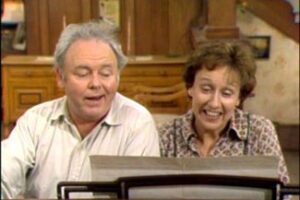
Any TV fan from the 1970s will likely tell you that they can still hear Edith Bunker singing “All In The Family’s” theme song “Those Were The Days.” The iconic television show brought memorable characters to life and to our living rooms weekly, for eight, side-splitting years. The Queens-based family — Archie, Edith, Gloria and Mike — became our best friends. Viewing their all-too-human, hilarious antics raucously entertained and gently educated us, bringing significant cultural issues to the forefront of the American consciousness and slowly heralding a shift in New York City’s way of life.
Tackling Issues Head-On With Humor
Produced by political activist Norman Lear and Bud Yorkin, the CBS sitcom was heralded for hitting a nerve as well as the public’s funny bone. Racism’s prevalence was a constant theme, earmarked by Archie Bunker’s working-class, everyman persona. Bunker, played by Carroll O’Connor, was snarly yet lovable, at least within the bosom of his family. The politically-incorrect Bunker is a stereotypical White Anglo-Saxon Protestant, untrusting of anyone unlike himself. A WWII vet born and bred in the good old USA, Bunker sees the world changing around him in incomprehensible ways. His guides to this brave new world are his gentle wife Edith (played brilliantly by Jean Stapleton), their daughter, Gloria (played by Sally Struthers) and Gloria’s husband, Mike, often referred to by Archie as “Meathead.” Mike’s character, played by Rob Reiner, often took it upon himself to chastise the ever stubborn Archie, representing the struggles felt in many households between middle-aged, conservative parents and their liberal children.

Videotaped in front of a live audience, the show dealt with topics often not discussed in polite company, including rape, women’s rights, menopause and breast cancer. Part of its charm and the cornerstone of its popularity was each actor’s ability to nuance the issues and of the day to get people thinking as well as talking. Edith’s seemingly-naïve character was played with depth and nuance. Archie, despite his shortcomings, was highly identifiable and a testimony to man’s ability to (eventually) yield.
Heralding Change, One Laugh at a Time
The issues of the day, like the Vietnam War and abortion, provided the backdrop against which this unassuming Queens family lived, loved and argued. Never preachy but always hilarious, “All in the Family” brought seminal issues to our living rooms and workplaces in a palatable way, ushering in new kinds of dinner table and watercooler conversation.
The show’s impact was far-reaching, not only for political reasons but also for the impact it had on the careers of many supporting cast members. Bea Arthur, who appeared as Edith’s ultra-liberal cousin Maude, enjoyed stardom via her own spinoff, “Maude,” and Sherman Hemsley and Isabel Sanford, who played African-American neighbors of the Bunkers, went on to break more television ground with their spin-off, “The Jeffersons.” Both shows continued the tradition of emphasizing political and cultural messages, delivered with humor.
“All in the Family” ran from 1970-1979.
